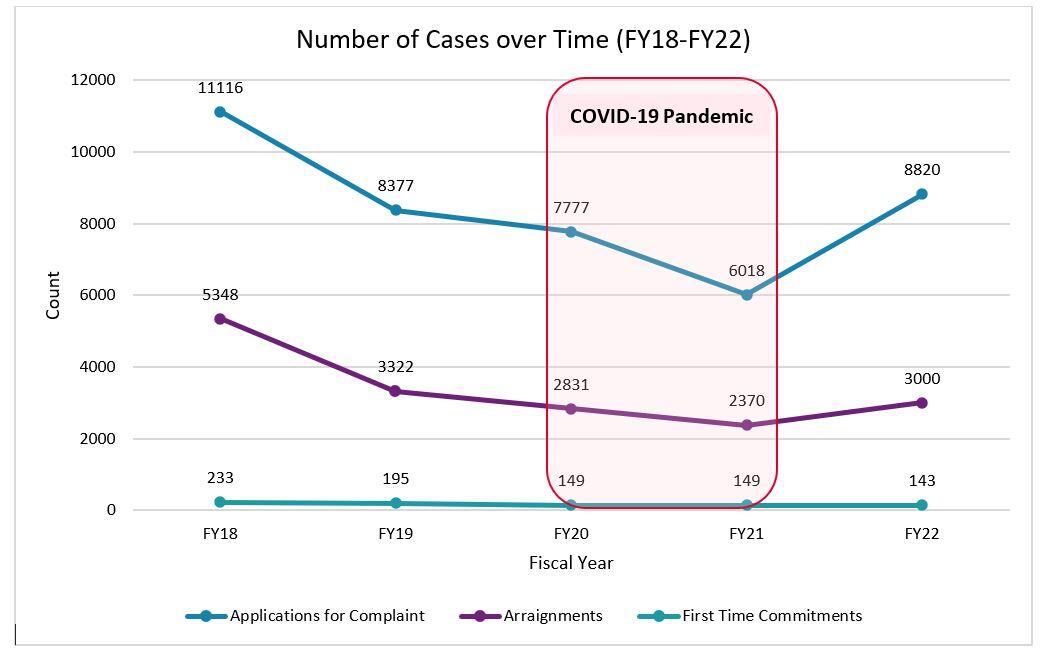- Office of the Child Advocate
Media Contact
Ari Fertig, Legislative and Communications Director
BOSTON, MA — A new report released today by the state Juvenile Justice Policy and Data (JJPAD) Board highlights the importance of state investments in services and supports designed to prevent juvenile delinquency and increase diversion in the wake of increases in youth referrals to the juvenile justice system this past year.
The report finds that in fiscal year (FY) 2022, referrals of youth to the juvenile justice system increased from the lows reached during the initial years of the COVID-19 pandemic, stemming from an increase in youth coming to the system with allegations of property, person, and weapons offense.
The increase does not come as a surprise to the Board: in 2021, the Board published a report describing the anticipated longer-term implications of the COVID-19 pandemic. In that report, the Board noted that the COVID-19 pandemic created circumstances that contributed to a stark decline in numbers in FY20 and FY21 and anticipated a potential increase in FY22, due to both the return to in-person activities as well as the impact of the stress and trauma of the pandemic on youth.
The Board also found that the number of youths being arraigned and processed through the juvenile justice system has decreased compared to pre-pandemic (FY 2019), particularly for youths charged with misdemeanor offenses. This suggests that even though more cases are being referred to the juvenile justice system, decision-makers working in that system believe that many of these cases should be dismissed or diverted rather than processed through the juvenile court.
“We know many youth and families endured a number of challenges and traumas in recent years that can contribute to an increase in delinquency. The data in this year’s report underscores the importance of ensuring youth and families are receiving services and supports, including access to diversion services, behavioral health supports, after-school and summer programming, and educational supports that can help keep youth out of the juvenile justice system,” said Maria Mossaides, Director of the Office of the Child Advocate (OCA) and Chair of the JJPAD Board.
The report also found that racial and ethnic disparities in our juvenile justice system continue to persist. While these disparities remain largest at the “front door” of the system (i.e. youth arrests and court referrals) as has previously been documented by the Board, this year’s Annual Report also found disparities in if and when youth are diverted: data indicates that white youth are likely being diverted more frequently earlier in the process (pre-arraignment) than Black and Latino youth, while Black and Latino youth are more likely to have their case dismissed later (post-arraignment) compared to white youth.
A wide body of research has demonstrated the positive impacts of diverting youth away from the formal juvenile justice system, both for the youth who are diverted and for overall public safety.
“The Commonwealth has shown great progress over the past decade in limiting the number of youth coming into contact with the juvenile justice system,” said Melissa Threadgill, Director of Strategic Innovation at the OCA. “While this is very positive news, there remain opportunities to increase the use of pre-arraignment diversion across the Commonwealth for youth who may currently be overlooked earlier in the juvenile justice process, including Black and Latino youth and youth with child welfare system involvement. We know diversion works, but we need to make sure all youth have equitable access to diversion programs.”
Despite the increases shown in this year’s data, the JJPAD report highlights the fact that overall, system use is still down compared to FY 2018, when the Legislature passed sweeping criminal justice reforms including juvenile justice provisions aimed at limiting the number of youth coming into contact with the juvenile justice system.
All legislative reports by the Board are available at: https://www.mass.gov/lists/jjpadcttf-legislative-reports-and-key-documents
###
About the JJPAD Board
In April 2018, the Legislature passed An Act Relative to Criminal Justice Reform, which created the Juvenile Justice Policy and Data (JJPAD) Board under M.G.L. Chapter 119, Section 89. The Legislature charged the JJPAD Board with evaluating juvenile justice system policies and procedures, making recommendations to improve outcomes based on that analysis, and reporting annually to the Governor, the Chief Justice of the Trial Court, and the Legislature. The statute creating the JJPAD Board also placed a special emphasis on improving the quality and availability of juvenile justice system data.The Child Advocate chairs the JJPAD Board and the OCA provides staffing for the Board’s work.
https://www.mass.gov/juvenile-justice-policy-and-data-board
About the Office of the Child Advocate
The Office of the Child Advocate (OCA) is an independent agency that serves children and families across the Commonwealth. The Office’s goal is to ensure all children receive appropriate, timely and quality services. The OCA collects and analyzes data and makes recommendations to legislators and professionals to improve these services. The Office also takes complaints and provides information to families who receive state services. The Child Advocate chairs the JJPAD Board and the OCA provides staffing for the Board’s work. Learn more about the OCA.
https://www.mass.gov/orgs/office-of-the-child-advocate
###

